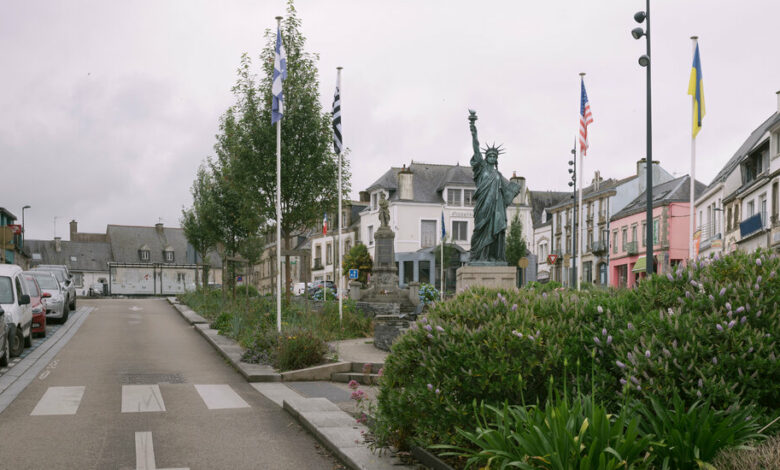Brittany was once a barren area for the far right in France. That is no longer the case.

So many locals have left Gourin, in the Brittany countryside, for the United States over so many decades that Air France has awarded the town a miniature Statue of Liberty.
The residents of this binational identity were so proud that four years ago they raised money to have the statue recast in bronze. It stands in a prominent position in the central square of Gourin, surrounded by poles with international flags.
And yet, in the recent European Parliament elections, nearly a third of local voters voted for the far-right National Rally, a French party built on intense anti-immigration sentiment.
“This is an area that knows what it means to be an immigrant,” said Pierre-Marie Quesseveur, a member of the local association Brittany TransAmerica, who expressed surprise at the election results. “We are very open to all cultures.”
Equally stunned by the results, and worried about what might happen in the French parliamentary elections starting this Sunday, was Gourin’s centrist mayor, Hervé Le Floc’h. President Emmanuel Macron announced the early elections on June 9, after the far right defeated his party in the European elections.
“We all have some family in the United States,” Mr. said. Floc’h from his office in City Hall, which overlooks the mini Lady Liberty. While many of those emigrants remained in the United States, others returned to Gourin with savings to start over here.
“In high school, half of my friends were born in New York,” said Mr. Le Floc’h, 61, who is also a dairy farmer.
The northwestern region of Brittany has been the heart of support for Macron and for years a seemingly impenetrable barrier against the far-right movement in France. The National Rally has only 8 of the 83 seats in the regional council, and has not won a single election for mayor or for a seat in the national parliament in the region.
The locals proudly called it the ‘exception of Brittany’.
The local culture of cooperation between the parties was not in line with the party’s divisive politics, explained Loïg Chesnais-Girard, president of the regional council. He calls the region ‘extremely moderate’.
Thomas Frinault, a senior lecturer in political science at the University of Rennes 2 who has studied the history of the National Rally in Brittany, said the party’s renewed popularity in the region is a sign that the party “has become normalised and is becoming dominant”.
In some ways, Brittany seems a hard sell to far-right politicians who claim that France is plagued by high crime and that there are too many immigrants demanding scarce resources and jobs.
Mr Le Floc’h cannot remember the last time a serious crime was committed in Gourin, a town of 3,800 people surrounded by cow pastures. Unemployment is so low that nearby food processing plants sometimes struggle to find workers, he said.
“Here we are not confronted with the immigration problem,” he said. “We have very few foreigners here.”
But speaking to locals at bars, restaurants and a cultural center where Gourin’s regular retirees’ meetings take place, it becomes clear that the far right’s political talking points and its grim view of the state of the country have taken root. There is also a bitter sense of abandonment among the ruling class in faraway Paris and a burning anger towards Macron.
“It’s only for the rich,” says Yolande Lester, 53, as she takes a break from the creperie where she works.
“Why don’t you try the RN?” she asked, calling the National Rally by its French initials. “They have never run the country.”
She added: “They couldn’t be worse.”
It is not that no one here has ever voted for the party. The number has been steadily increasing, Mr Frinault noted. But few had admitted to having voted for them, according to Joël Sévénéant, owner of the local radio station. “Now people are talking without any reservations,” he said.
What he hears most is the sense that life in rural areas hasn’t improved in 40 years. Gas and heating costs have gone up. Local hospitals continue to lose full-time emergency rooms, so when National Rally President Jordan Bardella talks about how undocumented migrants have free access to medical care, it strikes a chord.
“The RN is surfing on this discontent,” said Mr Sévénéant. “There is a general fed-up with Paris.”
Opposite the town’s 16th century Roman Catholic church, in a small bar where locals can buy newspapers and cigarettes, two men drinking beer after a long day of manual labor mentioned the reasons why they plan to rejoin the party of Bardella to vote.
Of rejected asylum seekers who are in the country illegally, Thierry Beigneux, 55, said, “They commit crimes.” “Not here,” he explained. “There is not much crime here. But in France there is.”
“We don’t have immigrants here,” agrees Hervé Pensivy, 62, a construction contractor. “But they will come.”
Mr Frinault, a university lecturer, said: “There is fear that is generated by television, radio, the press and social media. You have a population that, without having been confronted with these problems themselves, develops a kind of fear of them.”
Local National Rally candidate for Parliament, Nathalie Guihot-Vieira, acknowledges that the concerns do not stem from the reality of the area, but from a nagging fear that the problems will occur here.
“There is a fear of chaos,” she said during a brief break from the grueling two-week campaign.
Given the party’s lack of established names in this part of Brittany, known as Morbihan, Ms Guihot-Vieira, a retired naval officer, has had to learn on the spot how to register as a candidate and how to campaign. She only recently learned that she to take over her party’s campaign efforts throughout Morbihan, after the person who did that job was fired.
One of the party’s central principles is ‘national preference’: reserving social security, subsidised housing, certain jobs and free access to medical treatment for French citizens and not for non-French residents.
“We pay taxes, we live in medical deserts and can’t find doctors,” Ms. Guihot-Vieira said, “and yet they give free medical care to foreigners.”
“When you talk like that, people call you a racist,” she added. “But it’s not racism, it’s a demand for equality.”
In its early years the National Rally party was openly racist. Its founder and longtime leader, Jean Marie Le Pen, stated that people of different races “do not have the same capabilities, nor the same level of historical evolution” and was repeatedly condemned for making anti-Semitic comments and publicly downplaying the Holocaust.
Since his daughter Marine took over the leadership of the party in 2011, she has worked to eradicate anti-Semitism from the party. She even got her father expelled.
Florent de Kersauson, a parliamentary candidate and one of the elected regional councillors of the National Rally, said he had seen profound changes in the National Rally and in the reactions to it.
“People now regard us as a normal party,” he said as he walked through fruit and cheese stalls at a Wednesday market in the town of Carnac and handed out kites.
Mr. Kersauson, 74, said that when he first campaigned three years ago, “people insulted me, called me Hitler and a Nazi — which I found bizarre because my second wife was Jewish and I have two Jewish children.” Some people still give him the cold shoulder, but he says he no longer faces hostility. As he distributed his campaign materials, a retired couple even came up to shake his hand warmly and wish him luck.
Mr. Kersauson claims he has been treated unfairly because of his political views. He was convicted of financial crimes at two investment funds he ran — a ruling he is appealing and says was politically motivated. He faces financial charges in a separate case, which his lawyer says he is fighting.
He was accused of being racist in recent months after he retweeted a message with photos of two children, one white and one colored, holding Breton flags. The tweet said: “Real Brittany / False Brittany” in the Breton language.
“For me it was a joke. There was nothing cruel about it,” he explained this week, saying he now feels he was wrong to retweet. “Bretons are generally quite white, so the fact that we have a few black ones is nice.”
Many others, like Alex Flusen, are not convinced that the National Rally has fundamentally changed. He only moved to Gourin for work two months ago, but he plans to make the long trip this weekend — six hours by car — to Paris, where he is still registered to vote.
“I am the grandchild of immigrants. I could never vote for the RN,” he said. “My grandparents both survived Auschwitz.” The party, he added, “goes against all the values of France.”
Pollsters are predicting a high turnout, and Mayor Floc’h wonders what that will mean for Brittany and his town.
“Was the European election just a protest vote?” he asked. Maybe people vote differently when it’s a national election, he said.
“But maybe,” he added, “people will continue to protest.”
Segolène Le Stradic contributed to reporting from Paris




